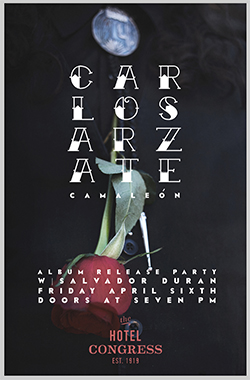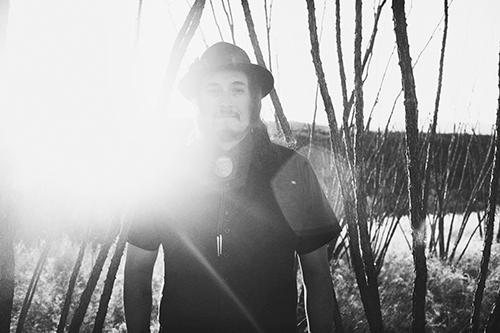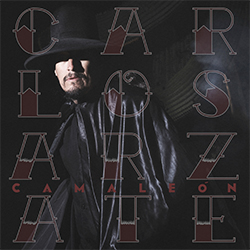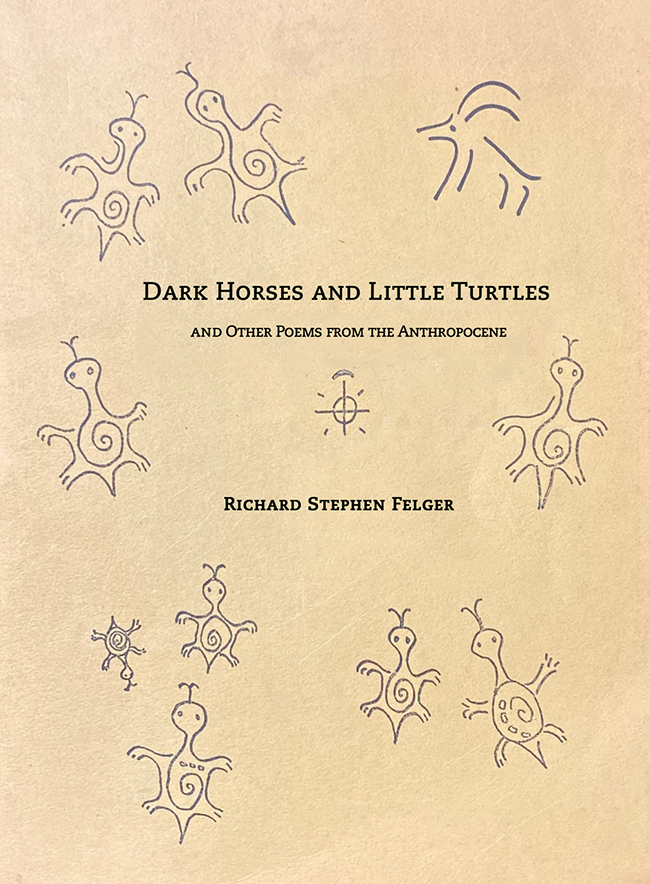An Early 21st Century Zeitgeist
Singer, songwriter, guitarist Carlos Arzate brings it again with his newest album Camaleón, set to drop on Friday, April 6 with a CD release party at Hotel Congress. And by “it,” I’m talking about another fantastic, multi-genre disc featuring a stellar line-up of tracks and musicians. Arzate collaborated with some of Tucson’s best performers, producers and studios for this collection, his third solo release since 2013.

CD Release poster
The idea behind naming the record Camaleón (Español for chameleon) is a nod to the special lizard species that have the impressive ability to change their skin coloration. “There are so many colors that are tattooed into me right now,” Carlos explains. “I feel confident to be able to produce an album where the songs come from all kinds of different styles.
“I’ve been exposed to so much different music and then spent large amounts of time with said different types of music – if it were the hard gangsta rap of the ’90s or the neo-soul of the ’90s or the grunge rock of the ’90s; the progressive rock of Tool, the soul of Marvin Gaye and Sam Cooke and Otis Redding. Growing up listening to Motown with my mom. Loving Prince. The Latin music we listened to as a kid – we grew up with a lot of norteño music,” he details.
Throughout the album, Arzate culls from many of those genres – incorporating soul, Latin rhythms, pop, rock, and the vibe of our Sonoran Desert. The styles may seem disparate, but the tracks flow seamlessly and transition masterfully from one cut to the next.
A few nights after interviewing Arzate, I set up on my back porch, put on the album and settle in for a deep listen. As I hit play, the wind is kicking up and the trees are dancing. The atmosphere – both meteorological and societal – is thick with anticipation. We’re in this early 21st century Zeitgeist, in an intense (snapping point? holding pattern?) at the precipice of – what all? Cultural, racial, environmental, humanistic, religious, evolution/revolution? Entropy in action? Will we stand together or fall apart? Maybe, or not. Both? Nothing? Fragments? Todo? Are we, as Homo sapiens, even that special? These are my thoughts as I reflect on the lyrics. Words that capture a state of humanistic affairs that are both contemporary and timeless.
The album’s first track is “False Alarm,” which seemingly inspires a cricket in my backyard to chime in with song’s opening shimmer. A shimmer that resonates like the fluid movements of a rain stick, or the tinkling of a wind chime. I stop the track. The cricket chirps for another few seconds. Then stops. I start the song again, the cricket chimes in again. Stop. Start. Stop and start. The cricket plays along, then quiets. The rain drops begin to fall.
I start the first cut once again, and the rain comes down steadily now. I am immersed in percussive rhythm that breaks out into a sonically Sonoran-nuanced rock song that speaks to our insecurities of not working hard enough, not being good enough, rich enough, accomplished enough.
It’s an ancient struggle, as Arzate elucidates in our interview. But in these times, we have the added entangled litany of numerous false narratives pushed upon us from myriad media outlets: Choices from the voices/Screaming at your head/They only mean you harm/It’s a false alarm/Screaming at your head. The mix is perfectly balanced with the vox, electric guitar (Conner Gallaher), drums (Winston Watson), bass (Thøger Lund), and Gabriel Sullivan’s percussion and synths.
The song is about the falsehoods of capitalism as culture and economy. We’re pushed to keep climbing this ladder to…where? For what, and to what end? And as intensely as the song builds, plateaus, and crescendos forcefully, it seamlessly transitions into the lulling, gorgeously melodic “Aye Princesa.”
This track is absolutely resplendent with Arzate’s impassioned vox, strings arranged by Ben Nesbit, Efrén Cruz Chávez’s congas, Gabriel Sullivan on guitar, and Ryan Alfred on bass. “It’s probably the most complete story-song I’ve written, it’s like a folk tale,” Carlos imparts. “I wanted it sound like it came out of the ’40s, like my Nana would have listened to as a teenager.”
The chorus, in Español, conveys both the romanticism and tension of the protagonist’s relationship with her padre: Aye Princesa/Con ojos de pearla/Aye Princesa/La hija prodiga.
The delicate ending of “Aye Princesa” melds into the super-chill soul track, “Closer to You,” with drummer Aaron Emery’s tight tapping opening. It spreads out gently with congas (Efrén Cruz Chávez), bass and electric guitar (Ryan Alfred), and Rich Katz on organ – all adeptly moving just under Arzate’s voice. Carlos sings with a genuine sweetness that is imbued with deep love. Horns, by Gary Love and Rick Perino, punctuate the song’s sultry lyrics.
“It’s a little inappropriate,” Arzate says, smiling, acknowledging that his beloved wife Beth inspired the words and sentiment. If you want to melt your lover, play this for them.

Photo: Puspa Lohmeyer
While the auditory transition to “Broken Glass” – the album’s next affecting soul song – is masterful, it carries an important, yet heavy and emotionally-jarring experience. It forces us to face this country’s embarrassing hypocrisy and deep social inequalities.
But something feels wrong/There’s a lot going on/In the name of progress/In the name of those of us/Living on the outside looking in.
“This speaks to today’s activists, as we transitioned to online activism versus physical activism – where the ‘active’ part of ‘activism’ requires you to go to a rally or go to a march or go clean somebody’s yard,” Carlos shares about the track’s lyrics. “I identified that in myself; it was a bad time for me, I was tired, I was working really hard and I was trying provide for my family,” he explains, specifically about his opening lyrics: None of this is convenient/It’s unfortunately a bad time for me/When you’re miles away from the incident/And uninterested in getting involved.
The tune incorporates a spoken word piece by two lauded local poets, Teré Fowler Chapman and Logan Phillips, who collaborated to bring poignant poetry that punctuate the social injustices thematically covered in “Broken Glass.”
Following is the 40-second instrumental breather, “Redemption,” which slides right into what ought to become an Old Pueblo hymn – “Canopy of Clouds.”
For many Sonoran Desert dwellers, the rain is a rapturous experience; from the sweet, tender caress of the gentle late-winter drizzles to the life-giving (ecological) orgasms released by the driving thrust of summer monsoons. Precluding that dizzying deluge is the tension of inhospitable temperatures, rising moisture and stacking clouds that tease and elude our passionate pleas during the height of summer’s baking drought and inhumane humidity.
To that, Carlos and company created an orchestral ballad with soaring strings, vocals and notes that pay respectful love and attention to the ecstatic marriage of water and earth.
Next is “No Other Place,” an uplifting pop song that is lovable and sweet. It’ll be a fun song to dance to live, and is a bright musical and lyrical respite mixed into the tracks. On “Hold Me Down,” Carlos gets autobiographical with this apologetic love song to his wife. If Carlos is one thing, he is authentic and open. He explains – “I screwed up, I hurt her feelings, and I didn’t realize it.” This tune includes gorgeous backing vox by Steph Koeppen, along with Randy Lopez on organ, Aaron Emery on drums, Gabriel Sullivan on synths, Ryan Green on acoustic guitar and Ryan Alfred on bass.
The next cut, “Try,” opens with beautiful haunting pedal steel played by Conner Gallaher, setting the vibe for this soulful country song – which was inspired by an experience Carlos had at a bar on Tucson’s east side. He observed a lesbian couple at the lively establishment, and no one was talking to the ladies, so he asked if he could sit with them. The three had good conversations, Arzate says.

Camaleón album Cover
“They were great, they were recently married, one of the women was from the mid-west, and she was facing a bit of consternation from her family because of her lifestyle. They shared their history, how they met, and I just enjoyed their company. When I was leaving, one of the women looked at me and said, ‘Thanks for leaning in.’ And I said, ‘Anytime.’ And that stuck me so hard. Back to that ‘active’ in ‘activism.’ Social media has marginalized true activism. But that episode – when she said ‘lean in,’ – I thought, ‘that’s exactly right.’”
Following is “Pure,” an exploration of hypocrisy and narratives that dictate absolute ideas of the pursuit of happiness – which features Brian Lopez on guitar. “There’s nuance in the world,” Arzate reflects in our interview. “The idea of purity doesn’t exist, there’s no religious or racial purity.” He sings: How does anybody know what is real and what is pure/I know we are pure together/And the world is bigger than you think.
Wrapping up Camaleón is a loving ode to his three children in “Ramble On,” sharing his adoration and blessings to the kiddos to go out and take on the world. Ramble on, ramble on/Go out and be brave go out and be strong.
We can all take on the world, in its complex nuances, and add our truth and efforts to lean in, resist hypocrisy, embrace love and engage in an authentic life by being brave and strong.
Camaleón was recorded at St Cecilia Studios, Landmark Studios, Dust & Stone Studios between 2016 and 2017. The efforts culminate into the CD release party at Hotel Congress, 311 E. Congress St., on Friday, April 6. The show starts at 7 p.m. and includes performances by Buyepongo and Salvador Duran. Tickets ($8-$10) are available at HotelCongres.com. More information is at CarlosArzate.com or at Facebook.com.
Category: MUSIC




